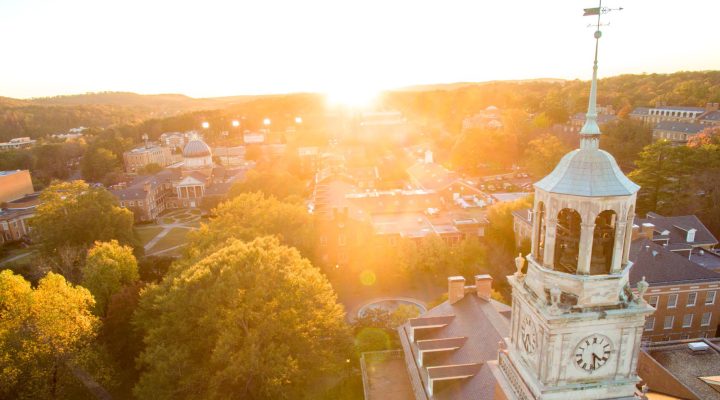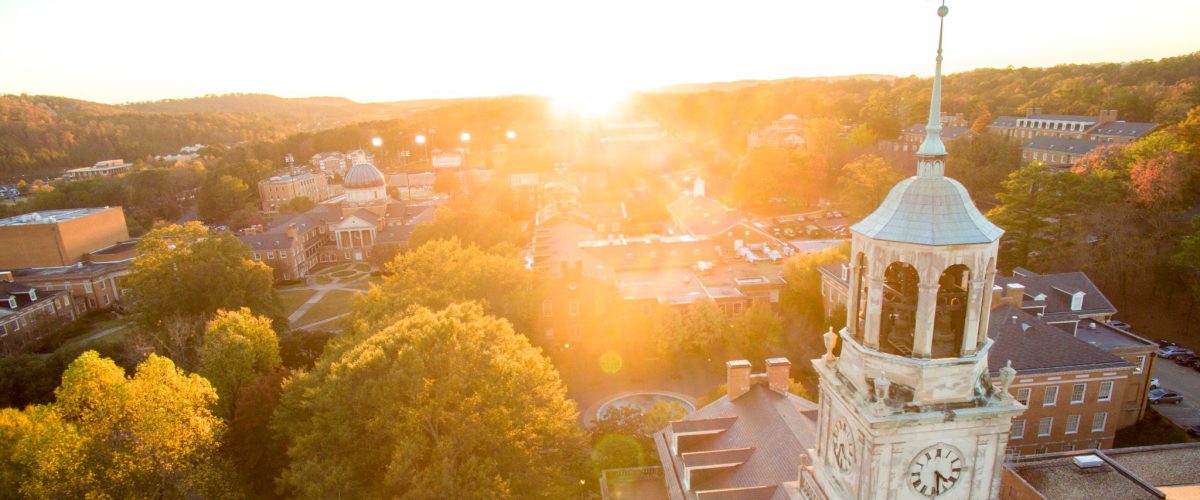Editor’s note: On Tuesday, Sept. 13, BNG sent two separate requests to appropriate media relations staff members of Samford University seeking a response to the events described in this article and two previous articles. As of this publication, three days later, the university has not responded to BNG and has issued no public comment to any news outlet.
The president of Samford University supports the campus pastor’s decision to exclude Presbyterian and Episcopal churches from access to campus because those denominations allow same-sex marriage.
Amid a controversy that has enraged huge segments of the Baptist school’s alumni base, President Beck Taylor — who has made no public comment on the matter — has begun responding to some alumni via email. In one such response, provided to BNG by concerned alumni, Taylor writes: “I understand that recent decisions made by Samford to restrict our formal ministry partnerships to those entities who support the university’s core convictions, including those concerning human sexuality and marriage, are disappointing to you. I’m sorry.”
He then explains that although Samford was “founded by the church and for the church, (it) is not a church. That said, the narrow decisions made do relate to the one part of the campus where we ‘do church.’ In that domain, I feel that it is imperative that we partner with those who subscribe to the university’s core commitments. In doing so, we exercise the same rights and responsibilities you discern and exercise as you govern your congregation.”
“I can assure you that in my heart of hearts, I love our LGBTQ students and employees, and I want to serve them well.”
Then he concludes: “In a world that propagates the lie that one must completely agree with another on such issues to truly love them and want to serve them, I can assure you that in my heart of hearts, I love our LGBTQ students and employees, and I want to serve them well.”
Vice president accused of misleading students
Samford alumni opposed to the campus restrictions found it ironic that Taylor talked about a “lie” when just the day before a Samford vice president told what they believe is a whopper in an email to students about the controversy.
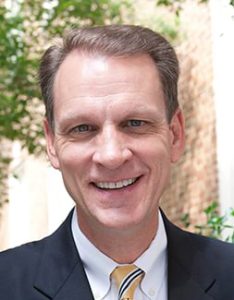
Phil Kimrey
That email was sent by Phil Kimrey, vice president for student affairs and enrollment management. In it, he claimed nothing really had changed at Samford.
At issue is something called Guest Ministry Organizations, which includes local churches and ministries that work with students. Thus, administrators in their internal communications have drawn a fine line between general campus access — “everyone is welcome here” — and being given official access to students on campus.
“We strive to provide a nurturing environment for students to learn and live the Christian faith,” Kimrey wrote to students. “In addition to worship and ministry opportunities offered by the Office of Spiritual Life, we welcome approved churches and organizations as Guest Ministry Organizations to engage students by sharing, teaching and modeling the gospel of Jesus Christ. Within this context, a goal is to connect students with local congregations and ministry organizations for corporate worship, spiritual development, and personal relationships with other believers.
‘These guidelines are not new — they have existed for many years and consistently align with Samford’s mission, vision, and core values.”
“To facilitate these partnerships and enable Samford to accomplish these important objectives, the Office of Spiritual Life follows its Guidelines for Guest Ministry Organizations, which you can see here,” Kimrey wrote to students. ‘These guidelines are not new — they have existed for many years and consistently align with Samford’s mission, vision, and core values.”
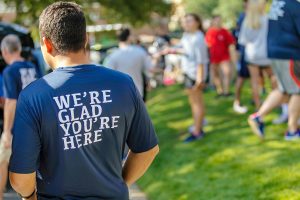
On move-in day this fall, a volunteer with a T-shirt message: “We’re glad you’re here.”
Mart Gray, a 1986 Samford grad, called out Kimrey on social media: “I was a student 1981-86 and my major professor was gay. It was known up through administration he was gay. He retired a distinguished professor. Cite whatever you wish, the hypocrisy of this stinks to the fourth generation and is a stain of legacy upon everyone in authority who absolves it. But opine away from the ivory tower.”
Other concerned alumni responded by saying the way this policy is being implemented now varies dramatically from their experience as Samford students. And if the policy hasn’t changed, why were these two groups this year for the first time not allowed to take part in the Ministry Expo? And why was one of those groups notified of its exclusion just 30 minutes prior to the event’s start time?
Also, the Guidelines for Guest Ministries document cited says nothing about sexuality, gender or marriage. It does say approved organizations “must be affiliated with a recognized church, parachurch or other ministry organization,” should “have and observe a statement of faith and theological perspective that is consistent with the Mission, Vision and Core Values of Samford.”
“A guest ministry shall fully and clearly disclose in writing to the campus pastor all of its affiliations, foundational theological tenets, means and institutional sources of support, and sponsoring organizations.”
That document grants all authority for campus access to a review by the campus pastor: “As a condition for campus access, a guest ministry shall fully and clearly disclose in writing to the campus pastor all of its affiliations, foundational theological tenets, means and institutional sources of support, and sponsoring organizations. Upon request by a student, parent or Samford employee, a Guest Ministry shall also disclose such information.”
Change in leadership
If the guidelines for approved ministry groups on campus haven’t changed, as Kimrey insisted, the people interpreting those guidelines definitely have changed. Samford has experienced significant turnover in leadership over the past three years.
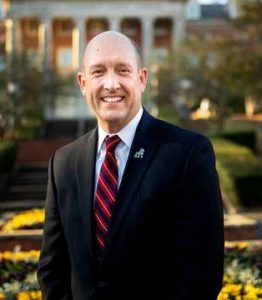
Beck Taylor
That change begins at the top, with Taylor assuming his role as president in fall 2021. Ironically, he came from the presidency of Whitworth University, a Spokane, Wash., school affiliated with the Presbyterian Church (USA), one of the denominations now apparently banned from official recognition on Samford’s campus. He succeeded Andrew Westmoreland, who led the school for 15 years and negotiated its formal disconnect from the Alabama Baptist State Board of Missions.
Six years earlier, another subtle shift had happened in administration. Brad Creed, who had been the founding dean of Baylor University’s Truett Seminary, left his post as Samford’s provost and was replaced by Michael Hardin, a respected business professor from a state school in Alabama. Academic credentials aside, Samford moved from a theologian to a business professor as provost.
Bobby Gatlin, the campus pastor, also is new. He came to that role in January 2019 after 16 years as minister to students at Johnson Ferry Baptist Church in Marietta, Ga., a prominent Southern Baptist Convention congregation. He followed in the legacy of two well-loved ministers to the university (the title changed with Gatlin): Jim Barnette and Matt Kerlin.
Earlier, in 2014, the office formerly known as University Ministries was renamed the Office of Spiritual Life, reportedly mirroring more of the standard practice of other conservative evangelical universities. Soon after, an ecumenical worship service that took place on Tuesday nights (called Shiloh), was shut down. It had become a haven for what alumnus called “progressive, disaffected and otherwise less-than-fundamentalist students.”
Students going to church?
Another irony of the current conflagration at Samford is that it involves a question of which local churches will be allowed to serve students on campus — at a time when most faith-based universities would be delighted to know their students were going to church anywhere at all.
National polling shows that fewer American college students now attend church than ever before.
National polling shows that fewer American college students now attend church than ever before. In fact, church attendance rates are plummeting.
And the percentage of Samford students who identify as Baptists also has been on the decline, dropping from 59% in 2000 to 30% in 2020.
One other statistical change puts Samford’s new exclusionary policy at odds with modernity: Today, 70% of Americans believe same-sex marriage should be legal — a dramatic change from even a decade ago. The exception to that trend: Conservative evangelical Christians.
Response and protests
As Samford stays largely mum on its decision-making process for the exclusionary policy and offers no public comment, the story is spreading as national news. On Sept. 15, Inside Higher Education published a lengthy report on the controversy under the headline, “Pro-LGBTQ Clergy Unwelcome at Samford.”
Not everyone is upset by the developments at Samford, however. Some Southern Baptist pastors, in particular, have taken to social media to express their agreement with excluding any group that tolerates or allows same-sex marriage.
For example, Griffin Gulledge, pastor of Madison Baptist Church in Madison, Ga., and a Beeson Divinity School graduate, tweeted: “Good for @SamfordU. They have every right to partner with those who share their convictions on biblical doctrine on sexuality and marriage. I’m a proud Samford grad, and just as much today as ever.”
But Will Yarbrough, a 2015 Samford graduate who previously worked for the Cooperative Baptist Fellowship, tweeted: “Samford has every right to close its doors to as many churches it wants. But what a wildly short sighted, antibaptist, and political decision. It’s a decision that’s harmful to the student body and to the reputation of the university as a whole.”
Several groups of concerned alumni share Yarbrough’s views and are organizing for a series of actions to call attention to what they believe is Samford’s capitulation to the most conservative elements of its alumni and donor base. These include a group of concerned clergy, a group of concerned law school graduates, and a group of alumni who identify within the LGBTQ community.
The refusal of Samford officials to comment to local or national media has left a wide opening for these protest groups to gain attention
The refusal of Samford officials to comment to local or national media has left a wide opening for these protest groups to gain attention — which they intend to do day after day after day until the university changes its policy.
One such critic is Thomas Duncan Armstrong, a 1973 Samford grad and financial adviser based in Birmingham. He joined with an online group called Safe Samford and its Dear Dr. Taylor Campaign, where alumni publish letters they’ve written to President Taylor calling for the current policy to be rescinded.
Armstrong said he wrote “not only as a Samford graduate, but also I speak as an Episcopalian and as a father in an LBGTQ family and member and advocate of the LGBTQ community in Alabama, in New York and in the world.”
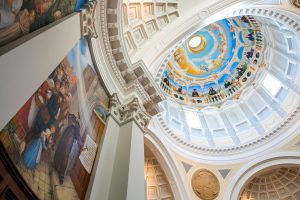
Interior dome at Beeson Divinity School.
He quoted Galatians 3:28, “There is neither Jew nor Gentile, neither slave or free, nor is there male or female, for you are all one in Jesus Christ” and said, “I would hope that Samford has not lost sight or would ever lose sight of this theological cornerstone of our faith.”
But his disheartenment with Samford over the current change is not the beginning of his disappointment, he wrote. “Suzan and I quietly ‘stepped away’ from Samford several years ago. We had proposed to Samford that we would fund a scholarship for an LGBT student or LGBT purpose. It did not go well. After more than a year, we withdrew the proposal. It had become evident to us that there would not be a place for our son, or anyone’s son or daughter who might identify with being lesbian, gay, bisexual, transgender or queer at Samford as a student, faculty member or on staff. We determined if there was not a place for those, there was not a place for us.”
He compared Samford’s actions to the grace he has seen expressed in the Episcopal church, which is now excluded from campus ministries at Samford.
“Matthew Shepard was tragically murdered in 1998 because he was gay. His parents were never able to find a place for their son’s ashes for fear of desecration. More than 20 years later his ashes were interred at the Washington National Cathedral (yes, a cathedral of the Episcopal Church). On a recent visit, I asked where I could find his crypt. I was told to look at the altar, and he is interred directly below, in the safest and most holy place in the church. Place is important.”
He concluded with this word to President Taylor in particular: “I still have hope. You are in a place to make a difference. I still have confidence in your leadership. I continue to wish you the best.”
Where are the trustees in all this?
While Taylor bears responsibility as university president, he reports to a 39-member board of trustees, seven of whom are clergy. If that board of trustees has taken any action related to the exclusion of affirming churches from campus ministries, that has not been made public.
To date, the board of trustees remains more silent than the university administration.
The board is led by William J. “Bill” Stevens, a Birmingham businessman who has served on Samford’s self-perpetuating board since 1997 and has been chairman of the board for more than a decade combined. He is a 1970 Samford graduate.
The board vice chair is Karen O. Bowdre, a senior United States district judge of the U.S. District Court for the Northern District of Alabama. She previously taught in Samford’s Cumberland School of Law.
One last irony
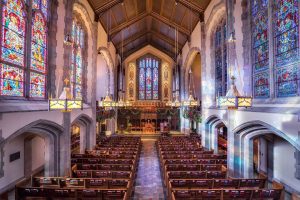
Independent Presbyterian Church, Birmingham
Samford’s Beeson Divinity School is named for — and was made possible by — a man named Ralph Beeson, who was a generous donor to the university. He made his money in life insurance sales.
When Beeson died, he left $50 million to Samford to start an ecumenical divinity school, $50 million to Asbury Seminary, a Methodist school in Kentucky, and $20 million to his church, which is Independent Presbyterian Church, a congregation affiliated with the Presbyterian Church (USA).
If Samford is consistent in applying its new policy of excluding from campus ministry any congregation affiliated with the PCUSA, it will exclude the home church of the man who made Samford’s seminary possible.
Related articles:
Samford, how long will you remain silent? | Opinion by Mark Wingfield
Samford University excludes Presbyterians and Episcopalians
Samford cancels Jon Meacham speech after ‘pro-life’ activists spark challenges
Samford forfeits Baptist funds but pulls plug on student gay-straight alliance

